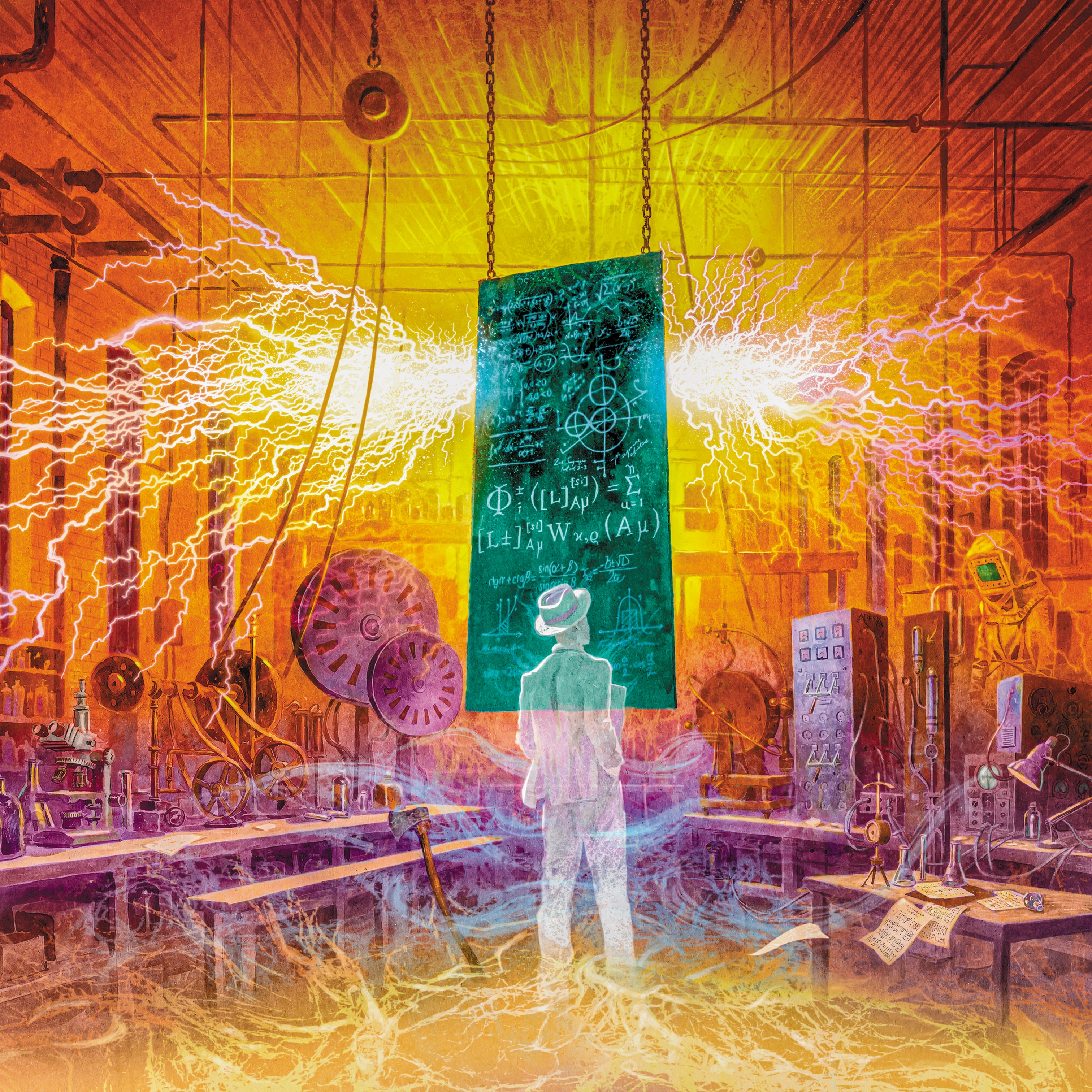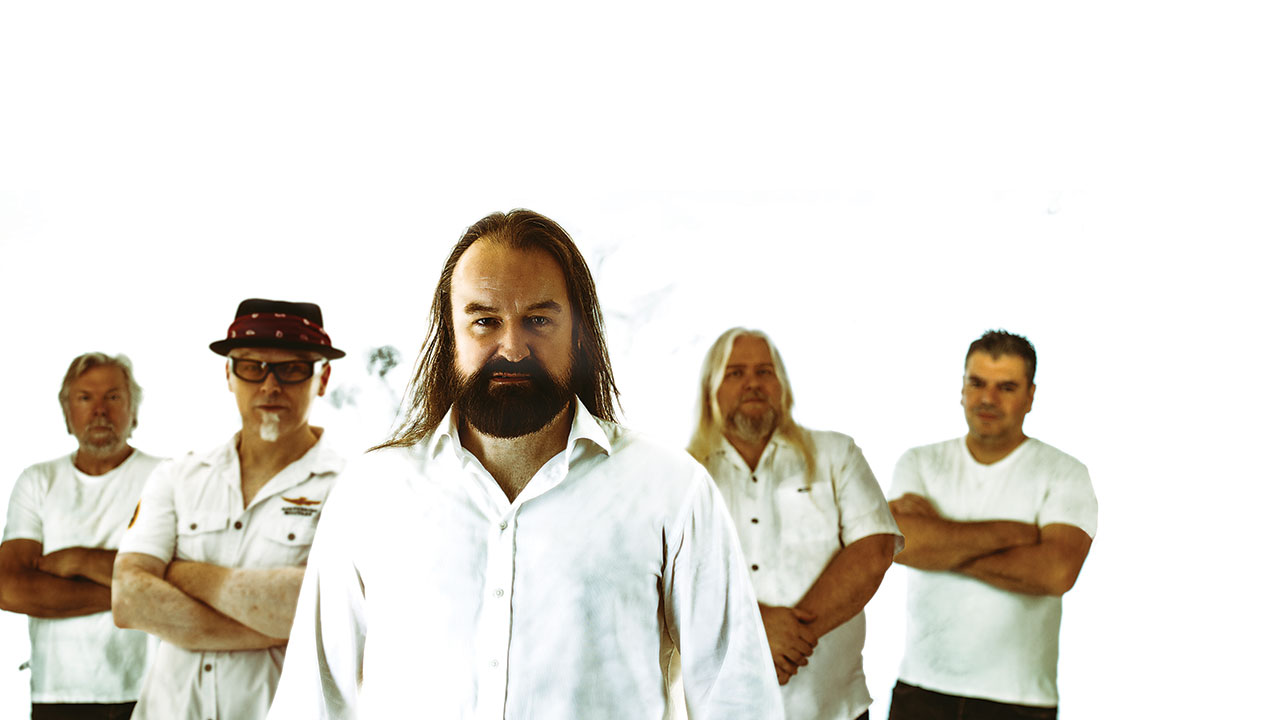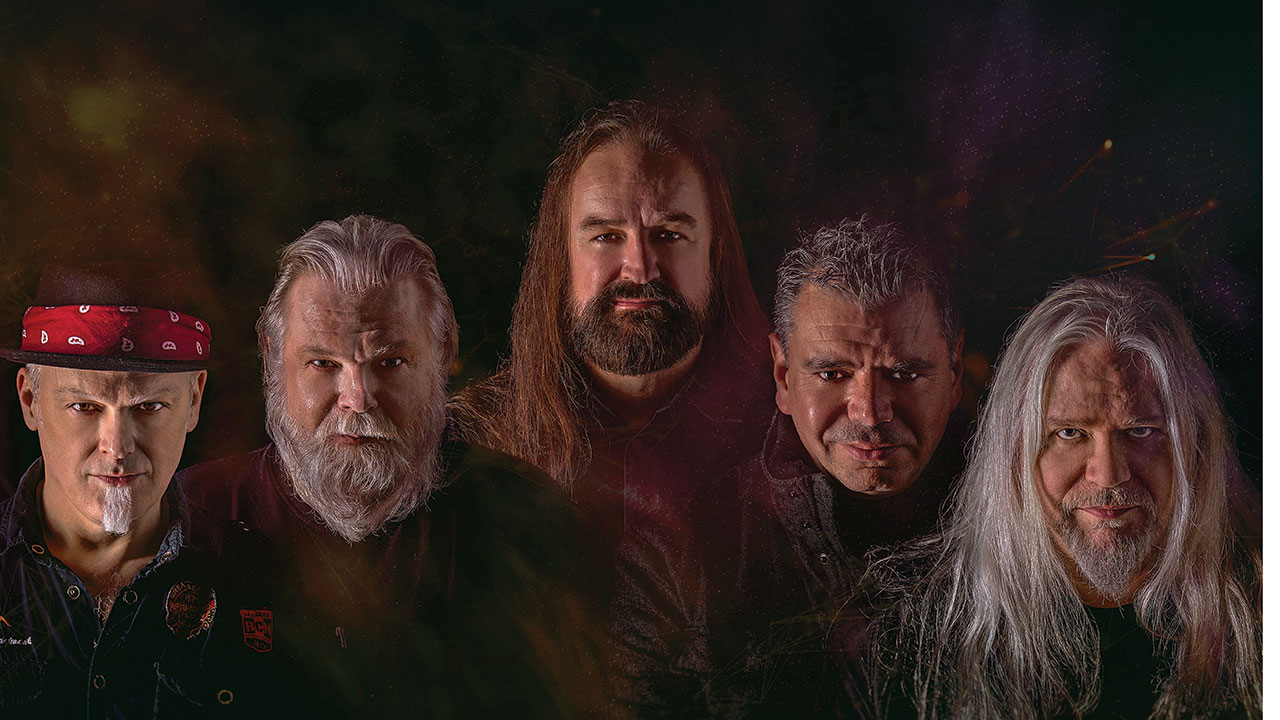With a new singer and a new album, the future looks bright for Arena. In 2022 Prog spoke with co-founder member Clive Nolan and new vocalist Damian Wilson to hear more about their 10th record, The Theory Of Molecular Inheritance, and how they’re finding a new lease of life nearly 30 years in.
During Prog’s chat with Arena about their latest album, The Theory Of Molecular Inheritance, new vocalist Damian Wilson veers the conversation towards the time he got pulled over by police for speeding at more than 100mph en route to sing at a Rick Wakeman gig. But there’s a deeper meaning behind the slightly alarming anecdote: his experience at the subsequent court appearance reflects what he believes is the “secret to life”, and also how feels about the future of Arena.
“I thought: Okay, it’s going to cost me a lot of money, I’m going to lose my licence, it’s going to be a disaster, so I’m going to go and enjoy it,” Wilson says. “The judge, we had him laughing; we had fun, the whole court had fun. And when the judge came out at the end, he said, ‘I don’t believe the police’, and that was it.
“That, to me, is the secret to life. You have got to enjoy every moment – even the bad moments, because they’re not always going to be that bad. Being with Arena is the same thing. We should enjoy every second that we have.”
With Wilson in tow, it’s a new era in the long and celebrated history of the prog rock heavyweights and the injection of fresh blood only looks set to bolster the English quintet further.
The wonderfully titled new album, their first with Wilson behind the microphone since he joined in 2020, is much delayed – blame the C-word – but it’s most definitely worth the wait.
“I actually think we’ve managed to produce a rather good album,” keyboard player and founding member Clive Nolan says politely. “I know it’s our job [to say that] in an interview like this, but there are times when the sum is greater than the whole, whatever that thing is. Somehow the album grows more than the parts that you put in.”

As suggested by the grandiose title, listeners who get their kicks from concept records – especially those with a scientific tinge – will get their fill, and then some. Lyricist Nolan is the mastermind behind an elaborate story, conceived after a rather lengthy chat with a professor of physics in the US; his initial idea was about all matter disintegrating, but never disappearing – and the molecules travelling through time before reintegrating with another human.
“I thought he’d laugh me out of the bar, but he said, ‘Ah, you’re talking about the theory of molecular inheritance,’” Nolan says. “I said, ‘Wow, that’s the album title right there. I’m nicking that!’ We talked for literally hours. My sort of little bit of sci-fi nonsense is of course complete nonsense. But in amongst all of that, there are some rather interesting and far more complex things than I’m able to explain, kind of physics explanations for some of the elements of what I’m sort of prattling on about.”
The theory manifests itself in the album through the story of a person showing the same traits and abilities as someone who went before them. A famed composer is involved in the fictional tale, too. The lengthiest track on the record clocks in at just under seven minutes – a vivid contrast to the 22-minute epic closer of their last album, 2018’s Double Vision – but the songs are intended to be viewed as segments of a larger whole.
Musically, Nolan and Wilson are joined by the usual Arena backbone: ex-Marillion drummer Mick Pointer, prog busy bee John Mitchell on guitar and bassist Kylan Amos. Although the lyrical themes may be sourced from a scientific imaginarium, the music itself is easy to grab onto: it’s hook-laden prog rock, occasionally emboldened with a harder edge that’s sometimes floral, often theatrical. Lathering the vocals on top is the experienced Wilson. He joined following the departure of Paul Manzi, who had drifted apart from Arena. But there’s certainly no animosity or hard feelings.
“He had other things that were going on in his life at the time, I think he had other commitments,” Nolan explains. “And I just think it was time for him to move on. For me it was a relief because I had sort of seen it coming a little while beforehand, and I could tell that the writing was on the wall.”
It’s perhaps little surprise, though, that Wilson – whose bulging CV also includes work with Threshold, Ayreon and Headspace – was recruited, having nearly joined the band on a couple of occasions previously. He and Nolan go back to the early 1990s when they worked on a Landmarq record, and have been friends since.
“Personally I think Damian’s the singer we should’ve had from the very first day,” Nolan proclaims. “As far as I’m concerned, he has all that I want from a vocalist. That’s not to detract from any of the other singers, they’re all great in their own way, but this is what I was looking for. We’ve nearly asked him at various points, but the stars haven’t quite aligned, until this time.”
And how has it been for Wilson? “I love it,” the vocalist says with a smile.
“There were a number of things that were essential to me. Number one is that I had Paul’s blessing. I didn’t want to be stepping into a role that had bad feeling or didn’t have the blessing of the singer that had been there previously. Paul was fantastic about it. And the other thing is just creativity: being able to express myself without treading on other people in the band and being myself.”

Arena also have a 25th anniversary tour scheduled in the UK and Europe this year. “I think there’s a lot of respect within the band, and I just hope that by the time we get off that tour bus, there’s still the same respect there,” Wilson says with an impish laugh.
But life on the road – and a bus – is certainly a factor behind why he accepted the offer. “One of the reasons that I wanted to join Arena was the fact that actually they are a tour bus band,” Wilson explains. “They go on tour on a tour bus. I live in a van, so therefore it’s home from home. I can do exactly the same as I do in my own van at home as I can in the tour bus. I can wander up and down the aisle naked, no one will make a fuss. It’s exactly the same!”
The live jaunt may be promoting a 25th anniversary, but the roots of Arena stem back further. The group formed in the mid-90s, with Nolan and Pointer the only two members remaining from the first line-up. The initial spark that led to Arena was rather inconspicuous: two fans in a fast food joint encouraged Pointer to try music again after leaving Marillion.
“We almost started by accident,” Nolan says. “This all began because a couple of people, who wrote a fanzine, bumped into Mick Pointer in a McDonald’s. Mick had been out of the music business for 10 years after leaving Marillion, and he was busy being a carpenter, making lots of money doing kitchens and things. And then these guys bumped into him, and they said, ‘Let’s go to the pub, it would be great to have a proper chat.’ So he agreed, and they went to the pub and they had an evening. They kind of got talking, and said, ‘Why don’t you do another album… we know this guy’ – who was me – ‘and he could do an album for you.’”
Just like that, Arena’s first record, Songs From The Lion’s Cage, was released in 1995, while The Visitor, from 1998, is regarded as a jewel in the crown. Their last – Double Vision – saw the light of day four years ago. The discography now stretches to 10 full-length studio albums, with a couple of handfuls of live releases and EPs to pad it out. Pretty good going for a band whose members have a smörgåsbord of side hustles.
“So far with Arena I think we’ve achieved an awful lot of the things that we’ve aimed to achieve,” Nolan says. “The things that any band would tell you: we’d love to have more sales, more audience, of course. And this is the kind of stepping stone album that might allow us to do that. It might well do.
“Some albums lifted us up quicker - The Visitor was a classic example. That album just kind of captured people’s attention, and it still does.”
Speaking down the line on Zoom, Wilson is effervescent considering the night is quickly drawing in and it’s something that doesn’t go unnoticed. Says Nolan, somewhat more moderately, “You bring in someone like Damian and you’re bringing in a new load of life.”
The vocalist is ready to contribute, to do his own thing, to be his own man. It’s perhaps telling that he has a music credit on each of the album’s 11 tracks.
“The one thing I had told myself was that I wasn’t going to join a band that had a number of different singers before me,” Wilson says, “because the comparison thing is distracting to what you actually are trying to do. When you sing with Rick Wakeman, for example, all the old singers from Rick Wakeman, their names will always come up. The point is, you’re not meant to be like Jon Anderson. You have to have your own stamp, you have to be expressing yourself. When someone comes along like myself, for example, and has their input, it will have its effect on the rest of the balance within the band.”
Prior to this, Nolan and Pointer had conjured up a ‘five album plan’ at the start of their Arena career, mapping out each release and the group’s upwards trajectory. Since reaching number five, the band have taken things album by album. It’s likely, though, that The Theory Of Molecular Inheritance will be a shot in the arm to take them even further as they inch towards their 30th anniversary. In some ways, Arena are only just getting started.
“We weren’t looking for an empty vessel,” Nolan explains about recruiting their new vocalist. “We were looking for someone who could actually help to revive us a little bit. A band goes on for as long as we do, and it’s the new blood that helps to get everybody else pumped up again. You almost need it every now and again.”

